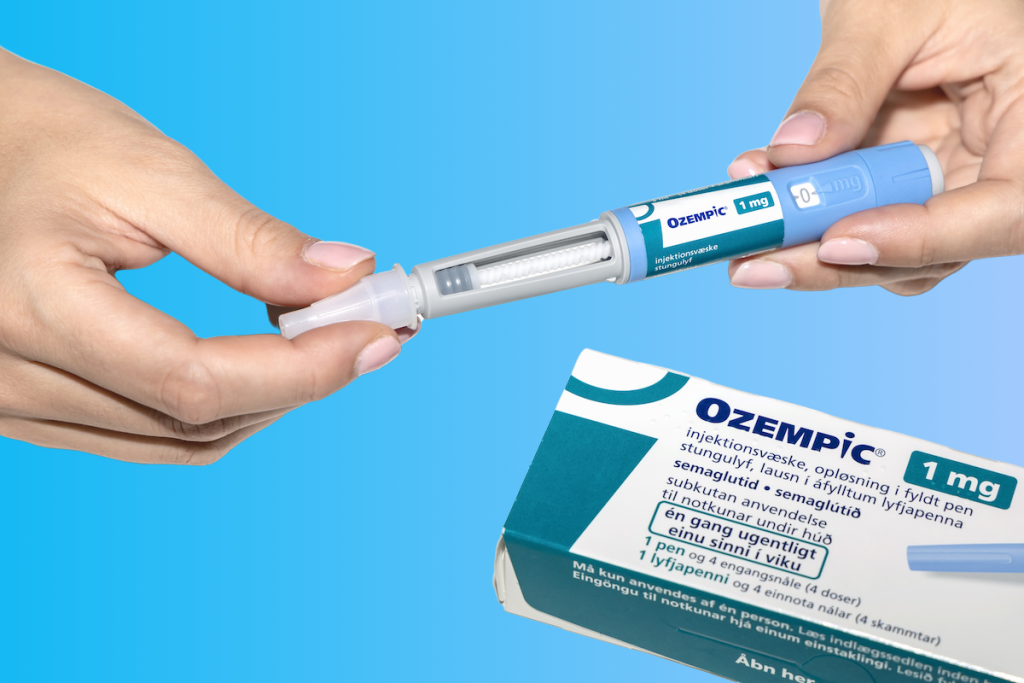Could the increase in Ozempic and other semaglutide drugs have a weight loss effect on people who aren’t even using them? Major food companies are worried that may soon be the case. Will it finally bring healthier options to the snack aisles?
In the last quarter of 2022, healthcare providers in the U.S. issued more than nine million prescriptions for semaglutide diabetes and obesity medications like Ozempic and Wegovy. This demand reflects the broader trend of these medications being used for their off-label weight loss benefits in people who aren’t obese or diabetic. Celebrities including Oprah Winfrey, Amy Schumer, and Sharon Osbourne have admitted using them, and there have been widespread speculations about others who showed dramatic weight loss, like Kim Kardashian. A recent analysis by Trilliant Health underscores this phenomenon, revealing a threefold increase in prescriptions of these drugs since early 2020.
Ozempic, a weekly injection developed by Novo Nordisk, emerged as the most prescribed drug in this category, making up more than 65 percent of the total prescriptions by the end of 2022. On average, users see about a five-pound weight loss every month they use the drug. Semaglutide drugs work by suppressing appetites and cravings. The effectiveness of these medications stems from their ability to mimic a gut hormone that suppresses appetite, which has not only captivated Americans seeking weight loss solutions but also captured Wall Street’s attention due to their significant impact on weight management.

However, the actual number of GLP-1 prescriptions may be higher than reported; this discrepancy is due to some health plans not covering weight loss treatments, forcing patients to pay out of pocket for the medications. The report draws from insurance claims of approximately 300 million Americans. But little is known about the long-term use of Ozempic or Wegovy, particularly for patients who don’t fit the clinical requirements; reports of using it for short-term weight loss have shown that once the medications are stopped, weight typically returns. Use of the semaglutide drugs has also been linked to increased risks of thyroid cancer, pancreatitis, and pancreatic cancer, hypoglycemia risks, acute kidney injury occurrences, gallbladder events, gastrointestinal disturbances, and cardiovascular effects.
Is Ozempic changing the snack industry?
The rapid rise in these drugs’ popularity has also led to concerns about the future of food categories driving the obesity crisis, namely snacks, soft drinks, and fast food, according to recent reporting from Bloomberg. It says Novo Nordisk’s Chief Executive Officer Lars Fruergaard Jørgensen has been receiving calls from concerned food industry giants.
“A couple of CEOs from, say, food companies have been calling me,” Jørgensen said, noting these companies “are scared” about how the semaglutides work, wider roll-out — specifically of cheaper options. Bloomberg Intelligence estimated that the weight-loss market could reach $80 billion by 2030. The cost of these drugs is currently a barrier for many, with Ozempic’s list price exceeding $935 for a monthly supply and Wegovy costing about $1,300. Similar to treatments for chronic conditions such as high cholesterol or hypertension, these medications are intended for long-term use to maintain weight loss.

But even if the drugs aren’t accessible to everyone, the industry’s questions are valid: could it be enough to take a bite out of these food categories? And is that really a bad thing? There have been growing concerns over ultra-processed foods for years and their link to rising rates of obesity, particularly among children. The National Institute of Health’s latest numbers show nearly 50 percent of Americans are clinically obese, with one in 11 suffering from severe obesity.
The shift isn’t going to happen overnight, though. According to the National Confectioners Association, the snack foods sector currently accounts for 27 percent — nearly a third — of all food and beverage sales in the U.S., and more than 90 percent of adults say they eat one or more snacks a day. But as drugmakers develop lower-cost versions of these drugs, coupled with general diet shifts for health and the climate, could we see a major shift away from high-sodium, high-sugar foods?
We’ve already seen lasting shifts to school lunches as a result of Michelle Obama’s Healthy Hunger-Free Kids Act of 2010. Flavored milk options have been reduced or eliminated, and major school districts like Los Angeles and New York City, have implemented plant-based options as well as reduced the number of processed foods. Healthier Mediterranean and plant-forward diets along with the buzz over Blue Zone diets following the recent Netflix series about the phenomena have seen consumers begin to shift their consumption habits. Veganuary, the month-long vegan campaign that happens every January, saw its biggest boom yet, reporting that 25 million people sampled vegan food during the event last month.

Bloomberg reports that the rise in Ozempic use has retailers like Walmart and food giants like Danone and Chipotle looking at how to stay profitable amid a less hungry population. The answer? Healthier options. Nestlé says it is already working on new snack products that complement the weight loss drugs while also limiting the loss of lean muscle mass. Conagra says its “department of demand scientists” is examining options. And popular chocolate label Hershey says it’s doing more to “constantly understand” the impacts these weight loss drugs will have on the categories. Barclays reported that Danone could double its $539 million in annual sales from protein yogurts and yogurt drinks alone as Ozempic users opt for healthier options.
As food giants pivot and change the snacking landscape to capture this new audience, it could mean healthier foods for everyone — even consumers who aren’t taking semaglutide drugs. But that may change too as more of these drugs could soon be on the market. Novo Nordisk recently announced its purchase of three new production sites in New Jersey. And, it says, the new locations will help it accelerate the production of its popular weight-loss drugs. “The acquisition complements the significant investments we are already doing in active pharmaceutical ingredients facilities,” Jørgensen said in a statement, noting that the sites will provide “strategic flexibility” to its existing supply network.
Related on Ethos:


